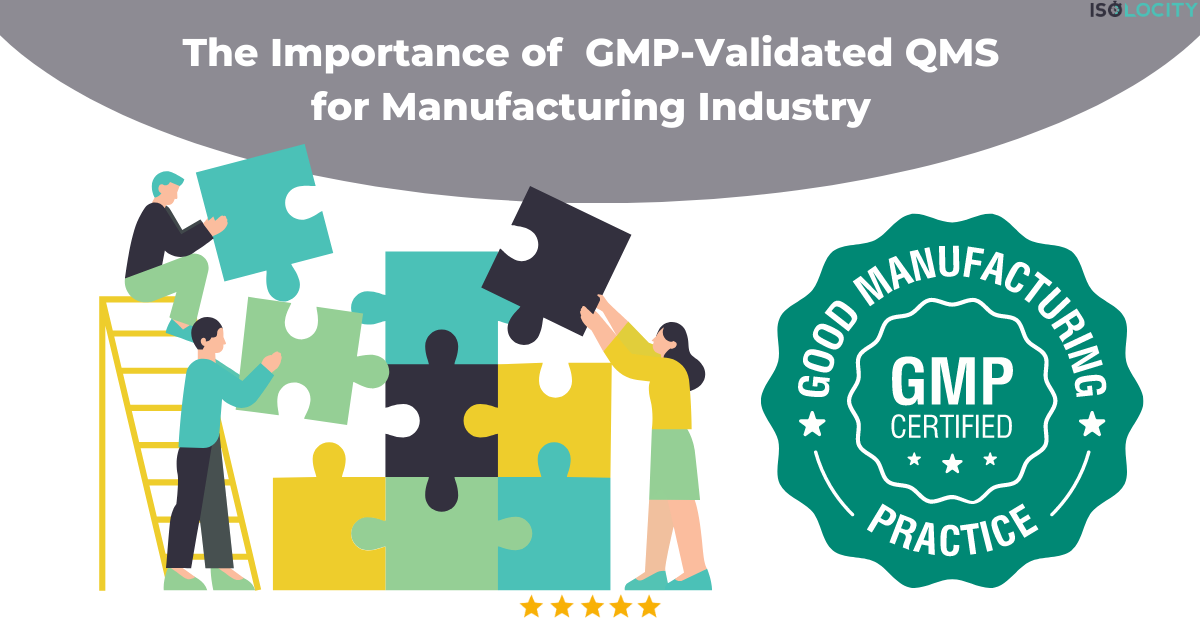When you are considering a quality management software (QMS) for manufacturing industry, we suggest you look for a QMS that is compliant with GMP. In the highly regulated manufacturing industry, ensuring compliance with Good Manufacturing Practices (GMP) is crucial for maintaining product quality, safety, and regulatory adherence. An effective QMS plays a pivotal role in achieving and validating GMP compliance. In this blog post, we explore the significance of a GMP-validated QMS and its impact on the manufacturing industry.
In addition to reading, you can watch this blog about GMP-Validated QMS for Manufacturing Industry too!
Meeting Regulatory Requirements
Regulatory bodies, such as the Food and Drug Administration (FDA) in the United States, enforce stringent guidelines to ensure product safety and quality in industries like pharmaceuticals, medical devices, and food processing. A GMP-validated QMS for manufacturing demonstrates a manufacturer’s commitment to adhering to these regulations. It enables manufacturers to implement processes, procedures, and controls that meet regulatory requirements, reducing the risk of non-compliance and associated penalties.
Enhancing Product Quality and Safety
A GMP-validated QMS for manufacturing focuses on quality assurance throughout the manufacturing process, from raw material procurement to final product release. By implementing robust quality control measures, batch testing, and documentation practices, manufacturers can consistently produce high-quality products that meet or exceed customer expectations. A GMP-validated QMS ensures adherence to GMP principles, leading to improved product safety, efficacy, and customer satisfaction.
Ensuring Consistency and Standardization
Consistency and standardization are vital in manufacturing to minimize variations and ensure uniformity in product quality. A GMP-validated QMS for manufacturing establishes standardized procedures, specifications, and work instructions, enabling consistent production processes across different product lines or manufacturing facilities. This consistency reduces the risk of errors, deviations, and non-conformance, leading to improved efficiency and overall product quality.
Enabling Risk Mitigation and Traceability
A GMP-validated QMS for manufacturing incorporates risk management practices. These practices enable manufacturers to identify, assess, and mitigate potential risks associated with manufacturing processes and product quality. By implementing risk assessment tools, manufacturers can proactively identify critical control points. They can also implement preventive measures and ensure traceability throughout the supply chain. This not only minimizes the potential for quality incidents and recalls but also enhances customer trust and brand reputation.
Facilitating Continuous Improvement
Continuous improvement is a fundamental principle of GMP and a validated QMS. Manufacturers can identify areas for improvement, implement corrective and preventive actions (CAPA), and drive operational excellence by continuously monitoring, analyzing data, and measuring performance metrics. By embracing a culture of continuous improvement, manufacturers can enhance product quality, optimize processes, and reduce costs. Ultimately, this increases competitiveness in the market.
Building Customer Confidence
In an increasingly competitive market, customer confidence is paramount. A GMP-validated QMS for manufacturing provides assurance to customers that products are manufactured in compliance with industry regulations and quality standards. Validated processes and controls instill trust in the manufacturing company, as customers can rely on the consistent quality and safety of the products they purchase. This confidence leads to increased customer loyalty and market differentiation.
Questions to understand if the QMS for manufacturing is GMP compliant
When evaluating whether a Quality Management Software is GMP validated, it’s essential to ask specific questions to assess its compliance with GMP regulations. Here are some key questions to consider:
Basic questions related to GMP
- Has the QMS been specifically designed to meet GMP requirements?
- Is the QMS developed and implemented by considering industry-specific GMP guidelines and regulations?
Module or feature related questions
- Does the QMS include robust document control mechanisms to ensure compliance with GMP documentation requirements?
- Are standard operating procedures (SOPs), batch records, and specifications in place and regularly reviewed to align with GMP standards?
- Does the QMS include comprehensive quality control measures, such as batch testing, in-process controls, and sampling plans, to ensure compliance with GMP quality standards?
- Are there processes in place to ensure traceability throughout the supply chain, from raw materials to final product release, as required by GMP guidelines?
- Are there mechanisms within the QMS to handle and maintain records of complaints, recalls, and adverse events, as stipulated by GMP regulations?
- Are there mechanisms in place within the QMS to address non-conformances, deviations, and CAPA in line with GMP requirements?
Validation related questions
- Has the QMS been audited or inspected by regulatory agencies/third-party bodies to verify compliance with GMP regulations?
- Has the QMS undergone validation activities, such as process qualification, equipment qualification, and software validation?
- Does the QMS incorporate formalized risk assessment procedures, such as FMEA, to proactively manage risks associated with manufacturing processes?
Competency related questions
- Do employees receive training on GMP principles and practices, and does the QMS include features that promote GMP awareness and adherence?
- Does the vendor have in-house GMP experts?
By asking these questions, you will gain insights into whether the QMS specifically tailors to meet GMP requirements. You will also determine if it undergoes validation activities and incorporates necessary documentation and quality control measures. Additionally, you can assess whether the QMS adheres to other essential aspects of GMP compliance.
Conclusion
In the manufacturing industry, a GMP-validated QMS is essential. A GMP-validated QMS ensures compliance with regulatory requirements. Additionally, it enhances product quality and safety, drives consistency and standardization, mitigates risks, enables continuous improvement, and builds customer confidence. Manufacturers can establish a strong foundation for excellence, regulatory adherence, and long-term success in the dynamic manufacturing landscape. They can achieve this by implementing and validating a robust QMS that aligns with GMP principles.




